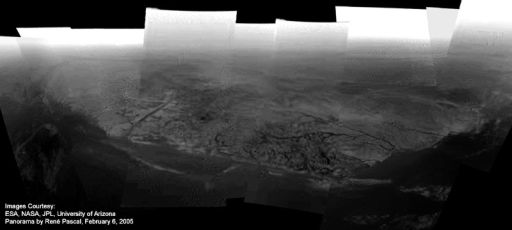Emily Lakdawalla • Aug 16, 2007
Ices, Oceans, and Fire: Tuesday morning: Goo-ology
The penultimate talk, given by Jeff Kargel, was titled "Theory of Geochemical/Geological Homology Applied to Hydrocarbon and Organic Substances on Icy Satellites and Other Solid Planetary Objects," which needs some translation; I'd call it "Does comparative planetology work at all, especially for Titan?" This talk was so useful that I asked Jeff for a copy of his Powerpoint and am reproducing his text almost entirely here, with some expansion for explanatory purposes. Thank you, Jeff!
He opened with a slide stating a provocative claim: "Mars is Mars-like, NOT Earth-like." (The statement was made by Nick Hoffman, he of "White Mars" fame.) Jeff commented that he could not but agree with the first half of the comment, but thought the second half worth exploring. Mars is, indeed, very different to Earth in a number of important ways:
- Its gravity is 40% of Earth's.
- Its geothermal flux [heat output] is about 40% of Earth's.
- Its atmosphere is 1% as dense as Earth's, dominated by carbon dioxide [not nitrogen or oxygen], 80 Kelvin colder than Earth's, has very low relative humidity, etc....
- It has no plate tectonics, no oceans, little or no granite [and therefore limited reprocessing of its crust, unlike what has happened on Earth], maybe no life [whereas everything we can see on, in, and above Earth has been affected by life], and has a unique geological history.
- Mars has a unique volatile assemblage and petrology [meaning that it started out with a different initial elemental budget, which is reflected in the present in different rocks and gases].
- Solid planetary bodies are made of many substances.
- The substances exhibit a wide range of physical properties.
- The conditions on planetary objects vary widely.
- Planetary objects exert a


 Explore Worlds
Explore Worlds Find Life
Find Life Defend Earth
Defend Earth


